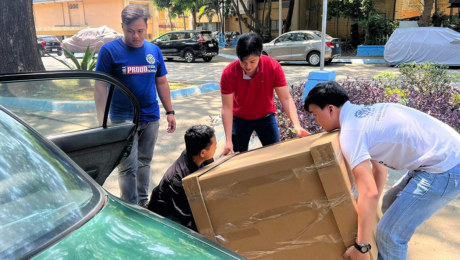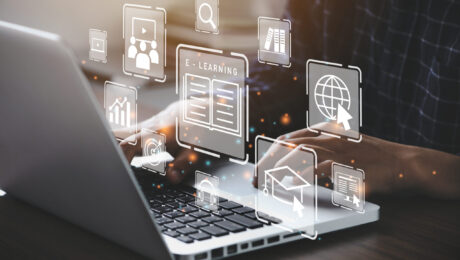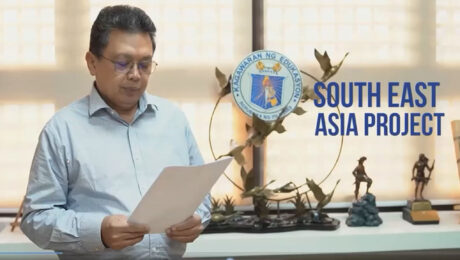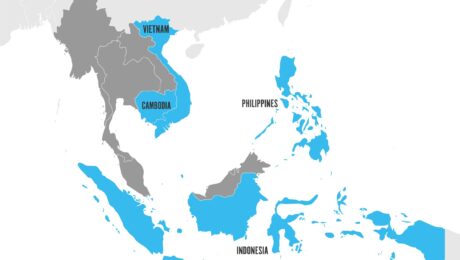TIESEA Philippines equipment delivery
TIESEA EQUIPMENT DELIVERED TO PHILIPPINE PROJECT SITES
In February, March and April 2023, the TIESEA Philippine team members had their hands full with one of the more challenging activities of the pilot project – the delivery of the project equipment to be used in the four technical training institutes (TTIs) participating in the delivery of the TESDA training program the “Photovoltaic Systems Installation NC II course. The target learners of the course are students in areas with limited or no internet infrastructure. This TESDA Training program is fast gaining acceptance in the Philippines because the country has a tropical setting. Numerous learners see the advantage of enrolling in this training program because of higher possibilities of being employed after they complete the course.
TESDA, the major project implementing arm of TIESEA. selected four (4) technical training institutions (TTIs): Rosario PTC Cavite; Pili PTC. Camarines Sur, Tagaloan RTC and the Balanginga National Agricultural School, Eastern Samar. They offer the Photovoltaic Systems Installation NC II’ course.
The delivery of the project equipment to the TESDA Headquarters and the four participating project sites took place after almost one month of careful inspection, evaluation and loading up of course software in the computer units and tablets to be used at the project sites. These equipment items are:
| Item | Quantity |
| Mobile Tablet for learners | 100 |
| Mobile tablets for eTESDA-NITESD | 25 |
| Mobile charging cart | 4 |
| Laptops for facilitators | 4 |
| Laptop for eTESDA-NITESD (will also serve as spare) | 1 |
| WiFi Router for offline test sites | 2 |
| WiFi Router for online test sites | 2 |
| m.2 Solid State Drive for MOODLE Box 128 GB | 3 |
| Wireless network content server | 3 |
| Uninterruptible Power Supply 650VA, Universal Outlet, 230V | 4 |
Another task the needed to be done carefully was packaging the equipment, particularly the fragile items. They were packaged in thick bubble wraps and thick wood boxes with strong braces to ensure that they are not destroyed by possible improper handling as well as the elements like strong rains and severe heat from the sun. It is to be noted that majority of the project sites are in islands which are quite far from the TESDA headquarters. Still in all, it was another productive and enriching experience for the eTESDA project team. They were able to gain substantial insights in handling fragile ed tech equipment as well as coordinate with contractors chosen for the delivery of the equipment.
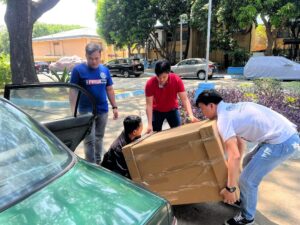
TIESEA project equipment were delivered to the TESDA national headquarters as they arrived in the county. The total time spread of the delivery was: end of February, the whole month of March up to April.
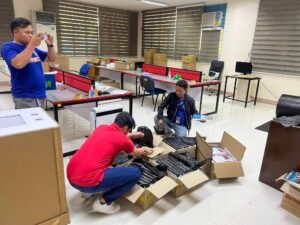
Equipment were carefully removed from the boxes and wooden crates as they are delivered on a staggered basis
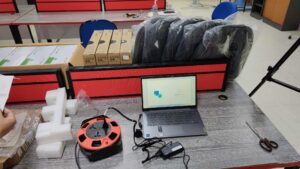
Some pieces of equipment were laid out before they were inspected and evaluated by the Etesda technical officers.
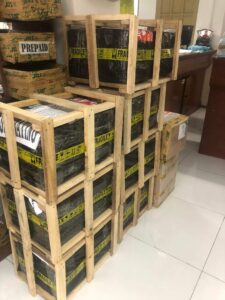
A number of equipment items were securely packaged with the use of wood and some heavy packing cardboards.
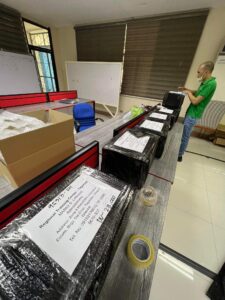
Before turning over to the delivery contractors, the equipment were carefully labeled and covered with transparent plastic to secure them from the elements.
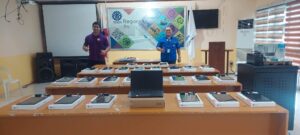
The carefully-wrapped laptops and tablets also underwent a final inspection before they were delivered to the end-user TTIs.
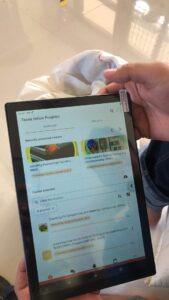
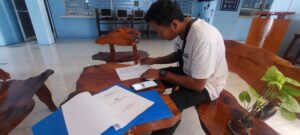
Finally, the learning devices are in the hands of a project beneficiary. A tablet, fully loaded with software and learning modules, are held gently by a learner… and is used with high interest and enthusiasm. Looking at this learner, filled with curiosity and eagerness, makes the project team feel that it was worth all the wait and effort, to at last offer this learning opportunity to the “hard to reach and unreached youth” in the Philippines.
- Published in Philippines Polit Interventions
TIESEA EdTech Interventions Proposal
Educational Technology (EdTech) has the power and capacity to significantly enhance teaching and learning for students in all parts of the world. Online, and digitally-enhanced, learning provides a new dimension that offers potentially unlimited opportunities; but, as we learnt during the COVID pandemic, these opportunities are unevenly spread. As a result of school closures, coupled with poor infrastructure, we know that many children in middle-income countries suffered almost two years without access to any form of tuition.
The Technology-Enabled Innovation in Education in South-East Asia (TIESEA) is a two-year multi-country program funded by the Japan Fund for Prosperous and Resilient Asia and the Pacific through the Asian Development Bank (ADB) and implemented by a joint venture between IBF International Consulting and Learning Possibilities. Aimed at piloting EdTech devices both in school and at home for students and teachers at secondary school level in order to assess the extent to which EdTech devices can be used to improve the learning and teaching quality among target students and teachers in the pilot school and community.
The TIESEA project, therefore, has an overriding ambition of proposing EdTech solutions in the four partner countries that are relevant, realistic, scalable, and sustainable; and which serve to bridge rather than deepen the digital divide. A common feature across all the country profiles is weak, unreliable, and uneven access to internet connectivity, especially in non-urban locations, and poor availability of EdTech devices for students.
Accordingly, in most interventions, at least part of the proposed solution is through providing rich and comprehensive learning resources through content-rich “internet in a box” with local distribution networks for universal access, where there is poor internet access. In most proposed cases the student devices are low-cost and durable tablets and cellphone handsets.
Through trialing the proposals in some of the most challenging environments, the hope of the project team is that there will good demonstrations of how technology-enhanced learning can be promoted and experienced by learners in all conditions. In this way, the TA team aims to show how scalability can be achieved through innovative technology applications and sustainable funding mechanisms that involve the private sector.
The country-level eReadiness assessments already conducted by the in-country experts of the TIESEA Technical Assistance (TA) team have identified the following national needs:
• In Cambodia, a need to use EdTech effectively to promote STEM and resource-based, student-centered education.
• In Indonesia, a need to find a mechanism through which schools in areas with limited Internet connectivity can join the rest of the country in adopting Kurikulum Merdeka (the recently launched, Freedom to Learn curriculum).
• In the Philippines, a need to find a mechanism through which vocational education can be extended to underserved areas of the country supporting youth in those areas to become skilled and work-ready.
• In Viet Nam, a need to equip students to be able to communicate effectively in English in an increasingly global society.
Read the full intervention here
Philippines Webinar Workshop
- Published in All Reports, Philippines All Reports, Philippines Workshops, Workshops
Executive Summary – Philippines (English and Tagalog)
Based on the five pillars of the ADB EdTech Readiness Framework, this report describes the current situation of education in Philippines in general, with a specific focus on how EdTech in being implemented to improve the quality of teaching and learning. The five pillars include infrastructure, government, schools/teachers, parents/students, and EdTech providers. By identifying the existing status of EdTech readiness, the report seeks to provide evidence against which decision-makers can identify initiatives likely to make a positive contribution to the quality of the education ecosystem and opportunities for public-private partnerships. The TIESEA team, as part of the study in the Philippines, also undertook a gender analysis and the report is presented in full in Annex 3. Historically, the education system in the Philippines favored males over the females, but from the 1970s onwards the number of college-educated women began to surpass that of men. It is reported that, currently, the number of girls completing secondary education surpasses that of boys by 12%. The Philippines is the only country in Asia to be in the top twenty for gender parity, though there is an underrepresentation of girls and women in the technology sectors, mostly due to cultural traditions and family preferences. Nonetheless, there are proportionally more women in the service sectors of the economy where there is often a high reliance on ICT skills. In contrast to international averages where, typically women’s aggregate wages are 20% lower than men’s, in Philippines women’s earnings are, when taken as a whole, are 10% higher. Although a great majority of female entrepreneurs operate in the small to medium enterprise (SME) sectors only a small proportion of them have had any training about harnessing technology as part of entrepreneurship training. This is despite man campaigns to promote women’s expertise in ICT. Nonetheless, recent government policy moves have resulted in increasing numbers of women enrolling in STEM-related disciplines at university level.
Download the full report
- Published in All Reports, Philippines All Reports, Philippines Summary, Summary
Report on Knowledge Sharing and Ideation Country Workshops and Regional Workshop April 2022
The aim of the TIESEA project is to identify what works in Education Technology (EdTech) in the context of the four countries where the project is operating: Cambodia, Indonesia, Philippines, and Viet Nam. Based on a landscape review of existing EdTech in each country and an assessment of supporting infrastructure as well as teacher, student, and parent capacity, a single intervention will be designed for each country. These pilot interventions will run in each of the countries for one year, and the impact on educational attainment and the quality of learning will be rigorously evaluated. The project will also undertake capacity-building workshops and host a major international conference during 2023 to share the findings of the project and to disseminate more widely the strengths and areas for
development in the key interfaces between schools, homes, families, and technology.
Download the full report
Report on Knowledge Sharing and Ideation Country Workshops and Regional Workshop
Diagnostic Assessment Report – Philippines Country Report March 2022
Based on the five pillars of the ADB EdTech Readiness Framework, this report describes the current situation of education in Philippines in general, with a specific focus on how EdTech in being implemented to improve the quality of teaching and learning. The five pillars include infrastructure, government, schools/teachers, parents/students, and EdTech providers. By identifying the existing status of EdTech readiness, the report seeks to provide evidence against which decision-makers can identify initiatives likely to make a positive contribution to the quality of the education ecosystem and opportunities for public-private partnerships. The TIESEA team, as part of the study in the Philippines, also undertook a gender analysis and the report is presented in full in Annex 3. Historically, the education system in the Philippines favored males over the females, but from the 1970s onwards the number of college-educated women began to surpass that of men. It is reported that, currently, the number of girls completing secondary education surpasses that of boys by 12%. The Philippines is the only country in Asia to be in the top twenty for gender parity, though there is an underrepresentation of girls and women in the technology sectors, mostly due to cultural traditions and family preferences. Nonetheless, there are proportionally more women in the service sectors of the economy where there is often a high reliance on ICT skills. In contrast to international averages where, typically women’s aggregate wages are 20% lower than men’s, in Philippines women’s earnings are, when taken as a whole, are 10% higher. Although a great majority of female entrepreneurs operate in the small to medium enterprise (SME) sectors only a small proportion of them have had any training about harnessing technology as part of entrepreneurship training. This is despite man campaigns to promote women’s expertise in ICT. Nonetheless, recent government policy moves have resulted in increasing numbers of women enrolling in STEM-related disciplines at university level.
Download the full report
- Published in All Reports, Philippines All Reports, Philippines Reports, Reports
